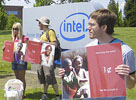
This post originally appeared on Change.org’s Human Rights blog.
Few things fire up a group of activists like being told that they have to move their protest to a place where they’ll be less disruptive. Essentially, that’s what tech powerhouse Intel told a group of human rights activists, after people concerned about Intel’s link to the black market mineral trade in Congo — blamed in part for the world’s deadliest conflict since World War II — bombarded the company’s Facebook wall this week.
On Tuesday, Intel removed activists’ posts from its wall, disabled new comments, and posted: “We are in the process of creating a place for this type of discussion and we will share the link of this page as soon as we have it.”
The Portland, Oregon-based activists, energized from their in-person demonstration Monday at Intel’s Portland-area campus, kicked up their protest a decibel on Twitter, prompting Intel to repost the wall comments and publish a statement yesterday via its Corporate Social Responsibility blog on conflict minerals. Intel said it is “actively engaged in efforts to identify a solution through our supply chain and others in our industry.” The statement said that the company had called a meeting of “the appropriate people from Intel” to discuss the issue of conflict minerals.
This week’s online protest — and Intel’s social media flub — took off after a group of activists gathered outside Intel with a request: Support the Conflict Minerals Trade Act, currently under consideration in the U.S. House, without amendments to water it down.
“They started a third party audit program for the smelters of tantalum, for their supply chain. And that was a huge step forward,” said advocate Lisa Shannon. “I was very disappointed last week and learned they had been so heavily involved in the lobby effort to gut the bill." The bill, proposed by Congressman Jim McDermott (D-WA) last year, would require companies importing electronics devices to declare whether their products are “conflict-free,” according to independent audits of Congo’s mines. The bill would require companies to account for their purchases – back to the source – so that the minerals trade is less easily dominated by groups who use the profits to commit atrocities against civilians.
Shannon, who founded Run For Congo Women to raise funds to sponsor women in eastern Congo and who recently came out with her first book, A Thousand Sisters, headed up the group of activists at Intel on Monday. Incensed by the revelation that it would cost electronics companies just pennies per product to put in place safeguards to ensure that their business doesn’t support eastern Congo’s armed groups, Shannon and a contingent of “mostly moms, kids, and vegans” picketed in front of the company. “Your Supply Chain, Your Problem,” and “She’s Worth the Extra ¢” their posters read. As a powerful visual, the group lined up jars containing 45,000 pennies — one for every death estimated to occur in eastern Congo per month.
Click here to read the rest of the post.
Photo: Activists gather in front of Intel near Portland, Oregon. (Willamette Week)

